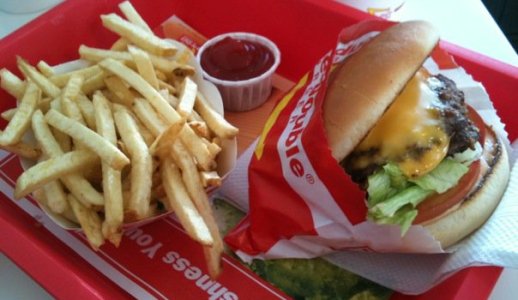
It doesn’t take neuroscience to figure out that eating too much junk food is not good for you.
Or does it?
According to a new study by The Scripps Research Institute in Florida, scientists found making meals of fatty foods may be as addictive as crack-cocaine, causing compulsive eating and obesity.
The three-year study, involving rats, found that over-consumption of high calorie foods can trigger addiction-like responses in the brain. Scientists found decreased levels of a specific brain chemical that allows a feeling of reward in the overweight rats. The low levels of this chemical (dopamine receptor) in the brain is similar to humans addicted to drugs.
Although research involving the study of animals cannot directly relate to human obesity, scientists say the findings may help in understanding the human condition and developing therapies to treat it.
Scientists devised a diet plan for three groups of rats. One group ate a balanced, healthy diet. Another received healthy food, but had access to high calorie food for one hour a day. Rats in the third group were fed healthy meals and given unlimited access to the high calorie food such as cheesecake, chocolate ding-dongs, bacon, sausage and the like.
The rats in the third group began to refuse the healthy food and preferred the “junk food,” quickly becaming obese. The scientists discovered the relentless junk food diet changed the function of the rat’s brains so much that they were actually addicted to the pleasure activity of eating unhealthy. When the scientists replaced the junk food with healthier fare, the rodents went on a two-week hunger strike.
In the real world, the availability of junk food is much more readily accessible these days then in the past, said Paul J. Kenny, Scripps Research associate professor and one of the study’s scientist, in a telephone interview.
“Let’s face it junk food is very pleasant, and people like to eat it,” he said. Cafeteria-style food contains high levels of processed sugar and fats but it’s also very cheap, Kenny said.
“Take pizza for example,” he said. “People like to eat it, and economically, it makes a lot of sense. It’s easy to make and it’s cheap. But continual access to these types of foods is a major problem.”
The underlining aim of the study was to understand how the brain responds to eating enjoyable fatty foods, and if it was similar to how drug users enjoy heroin or cocaine, said the professor.
“We found ourselves asking, ‘why do people overeat and why do people use drugs,'” said Kenny. “The behavior we discovered is quite similar.”
Kenny said people should ultimately have the choice to decide what they eat, but the ability to choose healthy food may be corrupted. Healthier food is often times costlier.
Another recent study, published in Health Affairs, found children from poor families are twice as likely to be obese as children from well-off families (45 percent vs. 22 percent). Minority children are far more likely to be obese than white children (41 percent of black and Latino children vs. 27 percent of white non-Hispanic children). And despite a host of medical conditions like diabetes, hypertension, asthma, or gallstones caused by obesity, children who become obese are more likely to become impoverished.
Obesity-related diseases cost the U.S. an estimated $150 billion each year, according to government agencies. An estimated two-thirds of American adults and one-third of children are obese or overweight.
“Childhood obesity isn’t just a public health issue, it’s a social justice issue,” writes Eric Tipler in the Huffington Post. Tipler, a current graduate student and former high school teacher says confronting child obesity is one of the major domestic challenges of our time. It’s where education, health care and poverty all intersect, he says.
We need to ensure that healthy food is available and more affordable, writes Tipler. He adds that those working for educational justice need to advocate for school cafeterias that offer fruits, vegetable and salad bars, not just pizza, cookies or slushy machines.
Photo: Pepe Lozano/PW

MOST POPULAR TODAY

Zionist organizations leading campaign to stop ceasefire resolutions in D.C. area


High Court essentially bans demonstrations, freedom of assembly in Deep South

Afghanistan’s socialist years: The promising future killed off by U.S. imperialism

Communist Karol Cariola elected president of Chile’s legislature






Comments